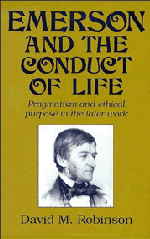Book contents
- Frontmatter
- Contents
- Acknowledgments
- List of Abbreviations
- Introduction
- 1 The Mystic and the Self-made Saint
- 2 Politics and Ecstasy
- 3 The Text of Experience
- 4 “Here or Nowhere”: Essays: Second Series
- 5 The Eclipse of the Hero: Representative Men
- 6 The Old and New Worlds: English Trait
- 7 “Work Is Victory”: The Conduct of Life
- 8 “Plain Living and High Thinking”: Society and Solitude
- 9 Toward a Grammar of the Moral Life
- Notes
- Work Cited
- Index
- Titles in the series
5 - The Eclipse of the Hero: Representative Men
Published online by Cambridge University Press: 18 December 2009
- Frontmatter
- Contents
- Acknowledgments
- List of Abbreviations
- Introduction
- 1 The Mystic and the Self-made Saint
- 2 Politics and Ecstasy
- 3 The Text of Experience
- 4 “Here or Nowhere”: Essays: Second Series
- 5 The Eclipse of the Hero: Representative Men
- 6 The Old and New Worlds: English Trait
- 7 “Work Is Victory”: The Conduct of Life
- 8 “Plain Living and High Thinking”: Society and Solitude
- 9 Toward a Grammar of the Moral Life
- Notes
- Work Cited
- Index
- Titles in the series
Summary
REPRESENTATION AND HUMAN HISTORY
“And every man shall be to thee for all men, each man being alone in the vast Desart; and thou shalt worship him, for he is the Universe in a mask”
(JMN, 8:405).“The astonishment of life,” Emerson wrote in Representative Men (1850), “is, the absence of any appearance of reconciliation between the theory and practice of life” (CW, 4:101). This sentence from “Montaigne; or, the Skeptic,” was drawn originally from Emerson's response to Margaret Fuller's tender letter of 1844 on the second anniversary of the death of Waldo. “I had no experiences nor progress to reconcile me to the calamity,” he admitted to Fuller. “There should be harmony in facts as well as in truths. Yet these ugly breaks happen there, which the continuity of theory does not compensate” (JMN, 9:65; see also L, 3:238–9). Like Essays: Second Series, Representative Men was an attempt to come to terms with this disparity. Emerson's concept of representativeness grew out of his long engagement with the idea of the universal or central man. In 1846, after he had begun the lectures that became Representative Men, he recorded an odd and compelling dream or vision in his journal under the heading, “Walking one day in the fields I met a man.” The passage describes his meeting “the central man” and seeing “again in the varying play of his features all the features that have characterized our darlings, & stamped themselves in fire on the heart.”
- Type
- Chapter
- Information
- Emerson and the Conduct of LifePragmatism and Ethical Purpose in the Later Work, pp. 89 - 111Publisher: Cambridge University PressPrint publication year: 1993



